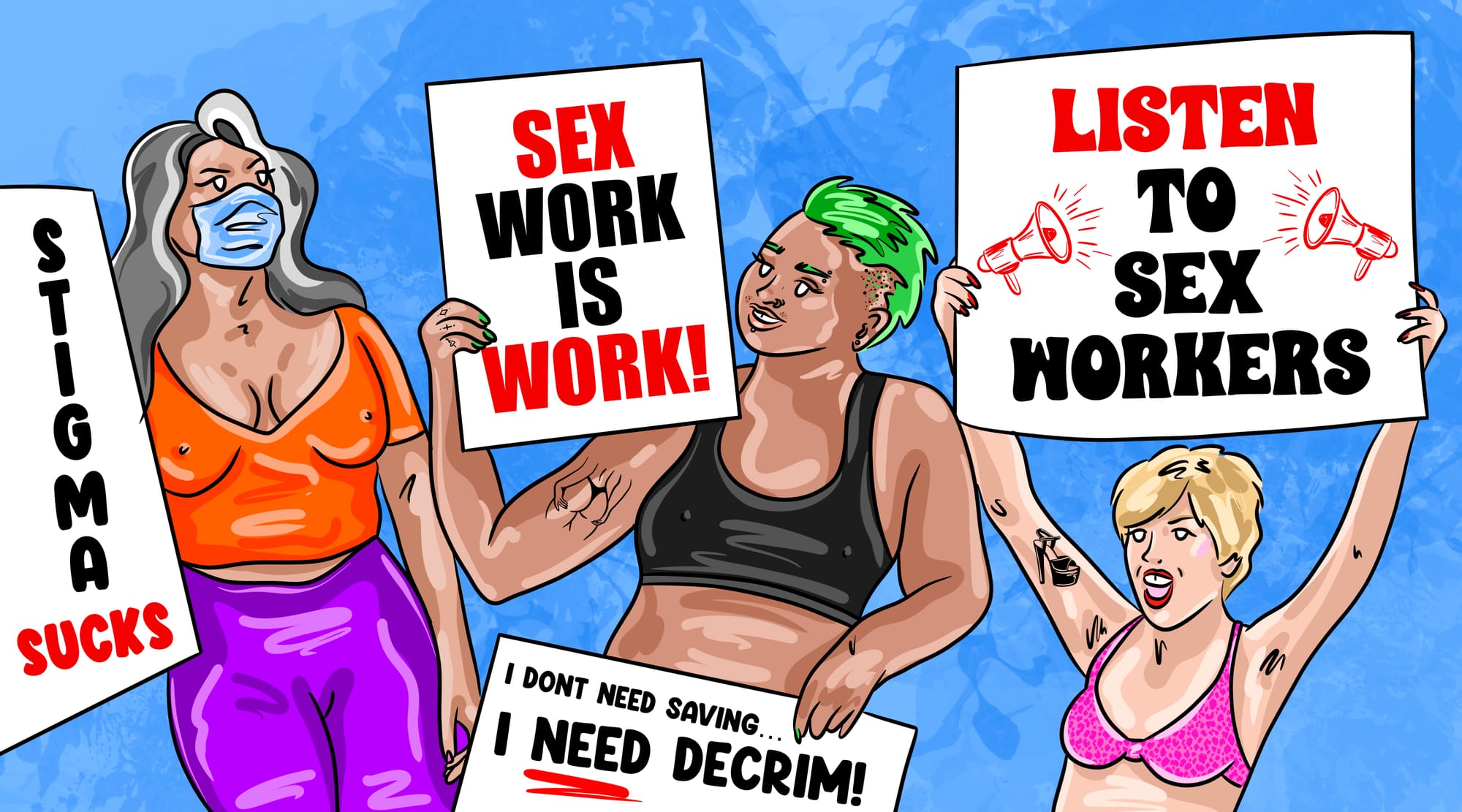The sex worker rights movement is often thought of in the context of sexual liberation and intersectional feminism, focusing more on the “sex” and less on the “work”. Due to criminalization and stigma, sex workers aren’t able to use all of the same tactics that other workers do to provoke change, but there are a great number of similarities between the sex worker movement and other labour movements.
In the UK, our fight for sex workers’ rights takes place under a model where the sale and purchase of sex are both legal, but many surrounding activities or workplaces are criminalized. This means our activism must be two-fold, demanding decriminalization and recognition as workers at the same time. We take part in the class struggle with the same vigour as workers suffering poor working conditions for other reasons, and we share strategies.
Our ability to unionize and engage in public demonstrations and strike action is semi-protected, because our work itself is not illegal. However, we still have to contend with the risk that we will be photographed or recognized when we show up to protest for our rights, and this has a chilling effect on the movement. Every sex worker who shows up to strike does so knowing that we are endangered by doing so. I’ve been photographed with a sign saying “no bad whores, just bad laws” enough times to have given up on plausible deniability about whether I am a sex worker myself or an ally.
Our activism must be two-fold, demanding decriminalization and recognition as workers at the same time.
We join forces with the women’s strike which occurs on International Women’s Day each year, and use our heightened visibility to draw media attention to our cause. There is a history of strike action in the UK being supported by groups of marginalized genders or sexualities; for example, the Lesbians and Gays Support the Miners alliance raised huge sums of money towards the miner’s strike between 1984 and 1985.
As of 2023, SWU (Sex Workers’ Union) became part of BFAWU (Bakers Food and Allied Workers Union). Under the umbrella of BFAWU, we have the benefit of being part of a trade union without being outed through our membership to it. Through the SWU, sex workers in the UK are able to place collective pressure towards improvement on the sites we use to advertise and on political figures who seek to restrict our rights or shut down our places of work. We can go to other union members for advice, plan group actions, and get support when we face an issue while working.
Compared to other kinds of work which aren’t partially criminalized, our rights as workers are severely limited. We are not protected from employment discrimination and we are forbidden from contracted employment for full service sex work. It is much harder to campaign for a pay rise when publicly making demands of your boss will result in the police shutting down your whole workplace.
Rather than being able to rely on the support of the public – because they are unaware of the extent of our mistreatment due to the need for discretion – sex workers are forced to rely on each other for the things our employers or the state should provide. If one of us falls on hard times, other sex workers fundraise to keep us fed and housed; we get no sick pay, parental leave, or time off for grief. These are things the broader labour movement achieved for other workers many years ago, while sex workers have been left behind.
Whorephobia has limited what we have been able to achieve for sex workers’ rights before now, but we’re fortunate enough to have a large number of committed sex worker activists among us. Our identities are politicized and we are treated unfairly, so it doesn’t take long to radicalize a sex worker and add another body to our next protest. Anyone who has tried to unionize a workplace will know how hard it is to get people interested, or to believe change can happen. When you chat to a room full of hookers and strippers and cam models about labour laws and unions, they seem to have a rare energy for organizing despite having every right to be dejected!
Sex workers are forced to rely on each other for the things our employers or the state should provide.
Whenever I begin to feel hopeless about how far we still have to go in the UK to have access to the same rights as other workers, I think about the progress made in Belgium and let myself believe we can achieve it too. Not only is sex work fully decriminalized in Belgium, but a new labour law was recently passed which allows sex workers to have employment contracts and again access to paid leave and benefits!
We anticipate our future recognition as workers, dreaming that what Belgian sex workers have achieved will spread like wildfire, but we must also remember our history. Next year, on International Whores’ Day (International Sex Workers’ Day to those of you who aren’t sex workers), it will be 50 years since the occupation of Saint-Nizier church in Lyon. French sex workers occupied the church in the 70s – sparking similar occupations by other sex workers across the nation in the aftermath – to draw attention to their poor working conditions, which mirror those many of us still work under now. Improvement isn’t guaranteed, so we have to make it happen.
Are you a sex worker with a story, opinion, news, or tips to share? We'd love to hear from you!
We started the tryst.link sex worker blog to help amplify those who aren't handed the mic and bring attention to the issues ya'll care about the most. Got a tale to tell? 👇☂️✨





